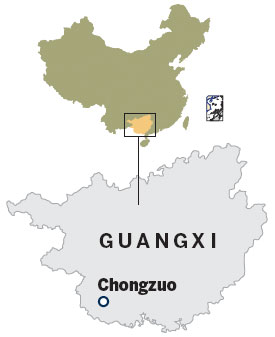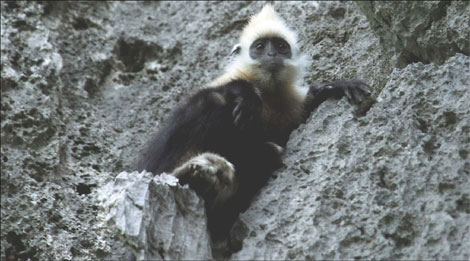Life and Leisure
For the love of langurs
By Li Xing (China Daily)
Updated: 2010-10-14 07:57
 |
Large Medium Small |
|
A male white-headed langur in the Nongguan mountain area of Guangxi Zhuang autonomous region. Photos by Huo Yan / China Daily |
Once caught in fishing nets for their bones as a cure-all for human diseases, the white-headed langurs are now a fiercely protected species, thanks to Professor Pan Wenshi. Li Xing reports
Few expected Professor Pan Wenshi would embark on a new crusade to conserve biodiversity when he arrived in Guangxi Zhuang autonomous region in the mid-1990s. By then, Pan had already won wide international recognition for the studies he and his students had carried out in the Qinling mountains, in southern Shaanxi province.
Their exhaustive research results, collected over years, unraveled the mysteries of the giant pandas living in the wild - their habits, eating patterns, family and community life.
|
A young white-headed langur. Provided to China Daily |
In 1996, Pan visited Guangxi. Soon the plight of the white-headed langurs caught his attention.
A comparison of a survey carried out between 1996 and 1997, and that done a decade earlier, showed that in just 10 years the number of white-headed langurs had declined by 62 percent. There were fewer than 100 of them in the Nongguan mountain area in Chongzuo.
The monkeys used to be spread out over 500 sq km, roaming the valleys in a region dominated by karst landforms.
However, when the local human population began to swell in the 1970s, farmers began to clear the karst hills to grow corn for food and sugarcane for cash. They also cut down the trees for firewood.
Langurs lost their homes and their sources of food dwindled rapidly.
The langurs feed on leaves and some folk tales even claim these small monkeys know which herbs to turn to when sick. Thus, for decades, the langurs were hunted down for their bones to be put into liquor as a cure-all for humans.
"When I was a middle school student, I heard that some farmers used fishing nets to catch the monkeys," Lu Jintong, a handyman at the Chongzuo Biodiversity Research Institute says, recalling the 1970s. "There was even a celebration one day when some people netted nine monkeys in one go."
Pan couldn't leave the region without doing something for these monkeys.
He and his team knew from their studies in the Qinling mountains that logging posed the biggest threat to the giant pandas. Pan wrote letters to the central government and it was his efforts that turned a state logging business in Yangxian county, part of the Qinling mountains, into a national nature reserve for the giant pandas.
In 1998, Pan and a few students settled down in an old military base in Chongzuo and began studying the white-headed langurs and their social behavior.
Above all, he was determined to retain the Nongguan mountain area as the langurs' last natural habitat.
However, he soon discovered that more than 5,000 farmers in seven villages also lived and made a living in this area. Poverty was rampant, as the excessive use of pesticides and chemical fertilizers had left their fields depleted, soil eroded and water contaminated.

"I wanted to find ways to change the way the locals lived and ensure the well-being of both the farmers and the langurs," Pan says, adding that protection of the endangered monkeys cannot be achieved at the expense of the livelihood of the farmers.
Over the years, he has devoted a lot of time to lobby and raise money. At his request, local stone quarries closed down to stop the damage to the local ecology.
Thanks to him, villagers in nearby Leizhai now drink clean water from a mountain spring and channeled through 7-km-long government-built waterworks. Pan also put together the cash he won from a Ford Environment Award and the money he raised from the Ministry of Agriculture and the Netherlands Embassy in Beijing, to help install methane gas pits in villages. About 1,800 rural families now mainly use methane gas for cooking, thus leaving the shrubs and trees that the langurs feed on, intact.
A new school has also been opened, to improve basic education for the farmers' children.
However, it's not been praise for Pan all the way. In fact, some have complained that he and his students have published few research papers.
"What is the use of research papers if local farmers continue to live in poverty and if the white-headed langurs are dying," he retorts.
Meanwhile, the local ecology and the monkey population are both thriving now. Thanks to abundant rainfall, and the farmers desisting from cutting down trees, the local flora has flourished and the limestone mountains have recovered their green cover. In the nature reserve, there are now more than 600 white-headed langurs, living in some 45 families, along with several smaller all-male families in transition.
Even the severe drought, early this year, left the Nongguan mountain area relatively unaffected, thanks to Pan and his team.
Their efforts are not lost on the local population.
Lu, the assistant at the Chongzuo Biodiversity Research Institute, says he worked in Guangdong as a migrant worker for years before he came to work with Pan.
"I enjoy working here," Lu says. "Even my temper has cooled down."
The institute has attracted a number of volunteers, among them Pan's two daughters. The older one, Pan Dai, has donated water-treatment equipment to supply the research institute with clean water and four electric golf carts to make it easier for researchers and visitors to travel between the fields and headquarters.
With her friends, Pan Yue, the younger daughter, has created a blueprint for a close-circuit television monitoring system, "so that my father can sit in his office and watch the langurs all day", she says.
She has also talked a major TV camera-making company into giving the institute five close-circuit monitoring cameras at the lowest price possible.
"The best way to save a species is to protect the ecological diversity of its habitat," Pan says.
"I have always believed that protecting the white-headed langur, the giant panda and so on means protecting the future of human society and of Mother Nature," the researcher says.
|
Professor Pan Wenshi is not only one of the country's leading zoologists, but also a devoted conservationist. |


